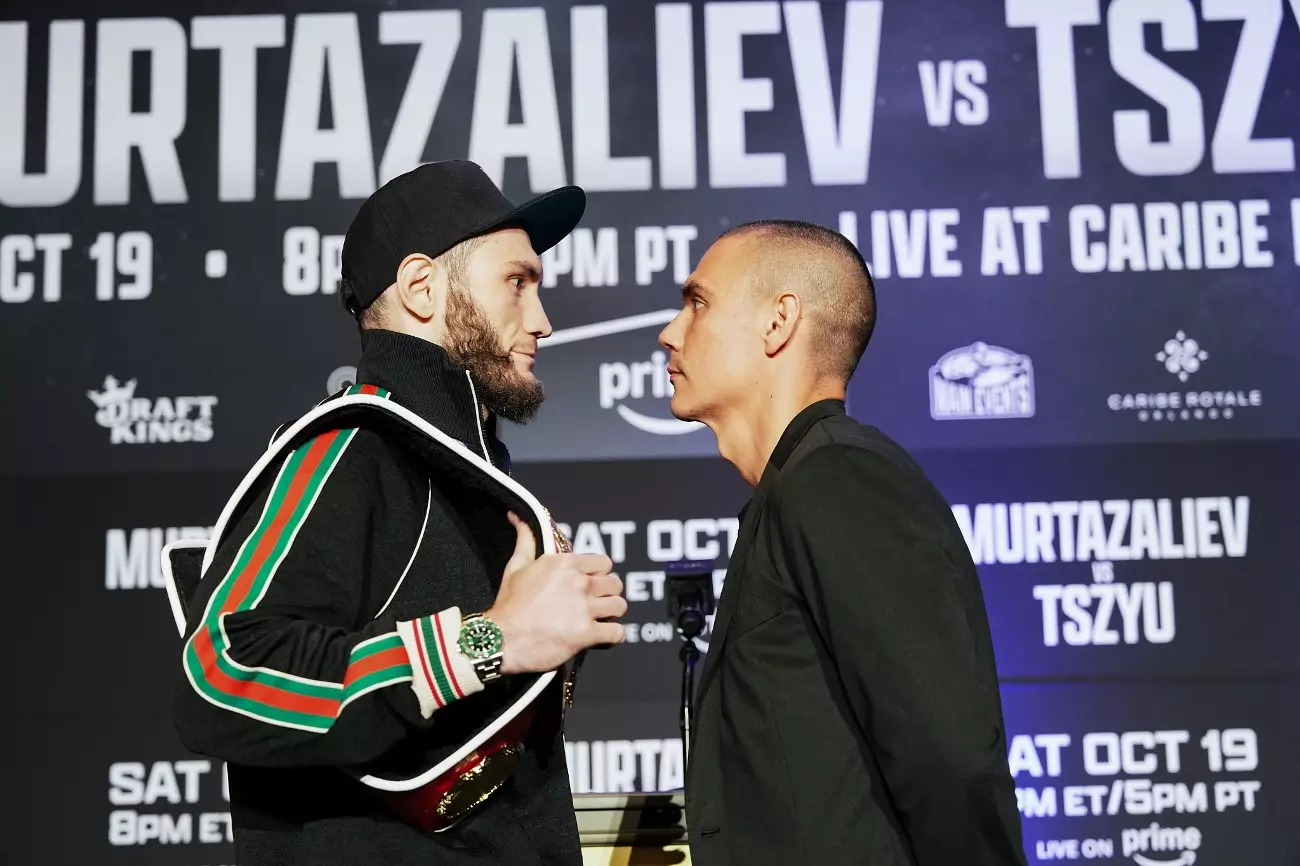As the date approaches for Tim Tszyu’s fight against IBF junior middleweight champion Bakhram Murtazaliev on October 19 at the Caribe Royale in Orlando, the Australian boxer is under immense pressure to prove that he is back in contention for the top titles. Tszyu, boasting a record of 24 wins and only one loss, is eager to make a bold statement by seeking a first-round knockout against Murtazaliev (22-0, 16 KOs). This ambitious goal not only underscores his intense preparation but also reflects what is at stake: the opportunity to solidify his position in a highly competitive middleweight landscape.
Following a courageous split-decision defeat to Sebastian Fundora earlier in the year, Tszyu is determined to erase the memory of that bout. His comments on the upcoming match illustrate a mindset focused on quick resolution and impressive performance. “I want the match to end as quickly as possible,” Tszyu said, revealing a sense of urgency not only to win but to re-establish himself as a formidable force in boxing. This attitude, however, raises questions about the risks associated with rushing into such a high-stakes matchup immediately after a loss.
The defeat against Fundora was a critical moment in Tszyu’s career that served as a harsh lesson. He has remarked that emotional distractions and lapses in concentration contributed to his performance. While recognizing the need for improvement, Tszyu appears to be treading a fine line between confidence and recklessness. The aftermath of a punishing loss should ideally involve a careful evaluation of weaknesses and a strategic re-entry into the ring, but his eagerness for a quick KO might suggest otherwise.
The challenge posed by Murtazaliev is not trivial. His unbeaten record and proven punching power suggest that Tszyu will not have a straightforward path to victory. Murtazaliev’s ability to adapt and punish opponents could make Tszyu’s strategy of an early knockout perilous. The height and reach advantages that fighters like Fundora possess can disrupt a fighter’s rhythm, creating an environment where Tszyu may struggle despite his aspirations. Rather than simply focusing on personal performance, Tszyu should recognize the tangible strengths of his opponent to avoid underestimating the obstacles he faces.
Tszyu’s projection of confidence is evident in his statements about Murtazaliev. However, it is crucial to note that his reflection on past mistakes is sometimes clouded by a desire to exude toughness. Accusations of excuse-making could linger, particularly if he continues to attribute his loss to factors like cuts rather than the opponent’s skill. Addressing such perceptions transparently may foster greater respect and credibility as he builds momentum from this fight.
Looking beyond the current fight, Tszyu has openly expressed interest in facing elite boxers such as Jermell Charlo, Errol Spence, or Terence Crawford within the next couple of years. This ambition showcases his desire not just to be a contender, but to reclaim his status as a champion. However, the path to these high-profile battles is fraught with challenges that require him to prove himself on a consistent basis. His focus should not only be on claiming titles but also on demonstrating the versatility and adaptability essential to succeed against top-tier opponents.
The reality is that gaining access to fights with Crawford or Charlo hinges on Tszyu’s performance against Murtazaliev. A definitive victory could catapult him back into title contention, but a subpar performance would necessitate an evaluation of his long-term strategy and approach to training. Tszyu seems aware of this—expressing his intent to remain focused on executing his game plan while maintaining a presence in the moment throughout the match.
As Tszyu prepares for the fight, he must weigh the lessons learned from the previous encounter with Fundora. Insight derived from past experiences can be invaluable, shaping the mindset and approach of a fighter. Tszyu’s claim that he doesn’t dwell on watching his fights can be seen as both positive and negative. While it may keep him from becoming overly critical, a lack of analysis could also prevent crucial learning opportunities. Knowledge is power, particularly in a sport as intricate as boxing.
Tim Tszyu’s impending bout against Bakhram Murtazaliev represents not only a crucial turning point for the fighter but a significant moment in his career. The blend of determination, ambition, and the weight of past mistakes looms large over this high-stakes match. It is essential for Tszyu to harness the lessons learned while respecting the capabilities of his opponent, as he maneuvers through the competitive landscape of boxing. The potential outcomes of this fight will set the tone for Tszyu’s future in the sport and his pursuit of greatness in the ring.


Leave a Reply